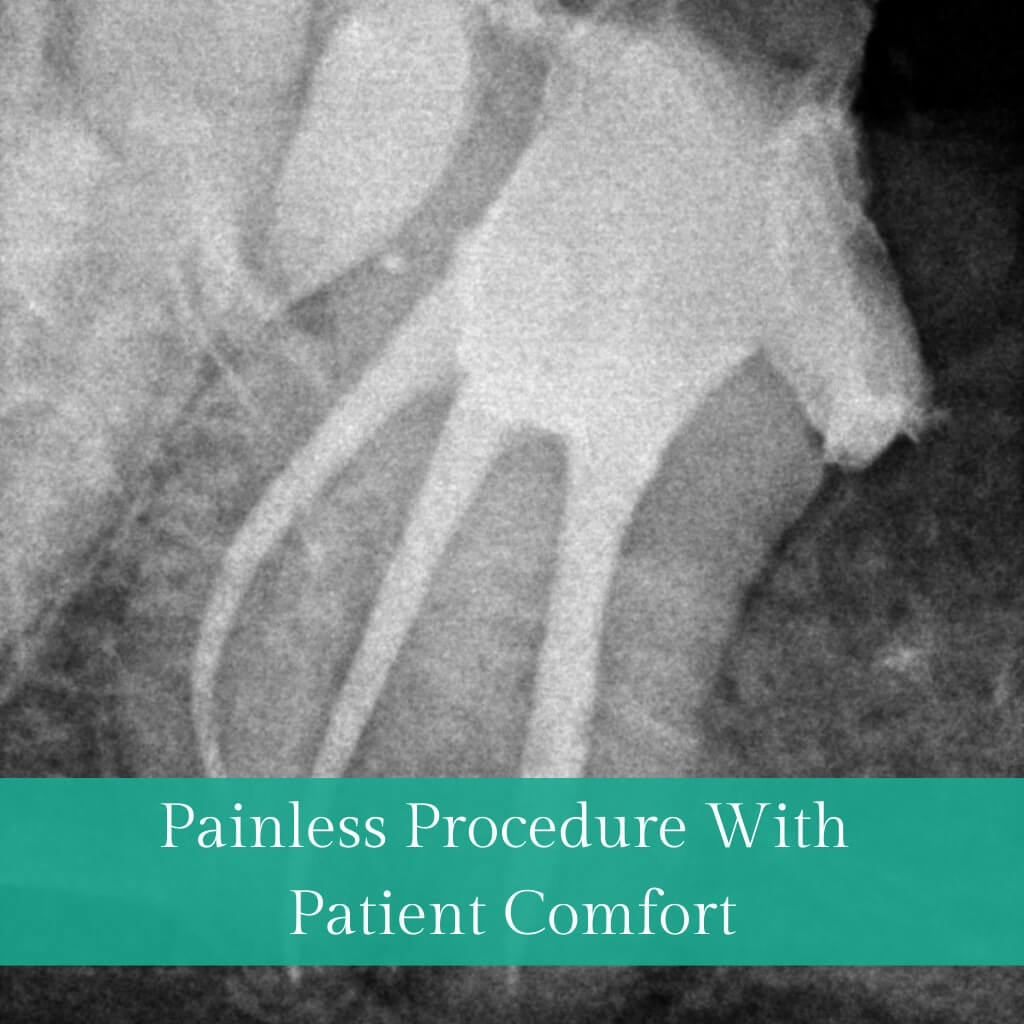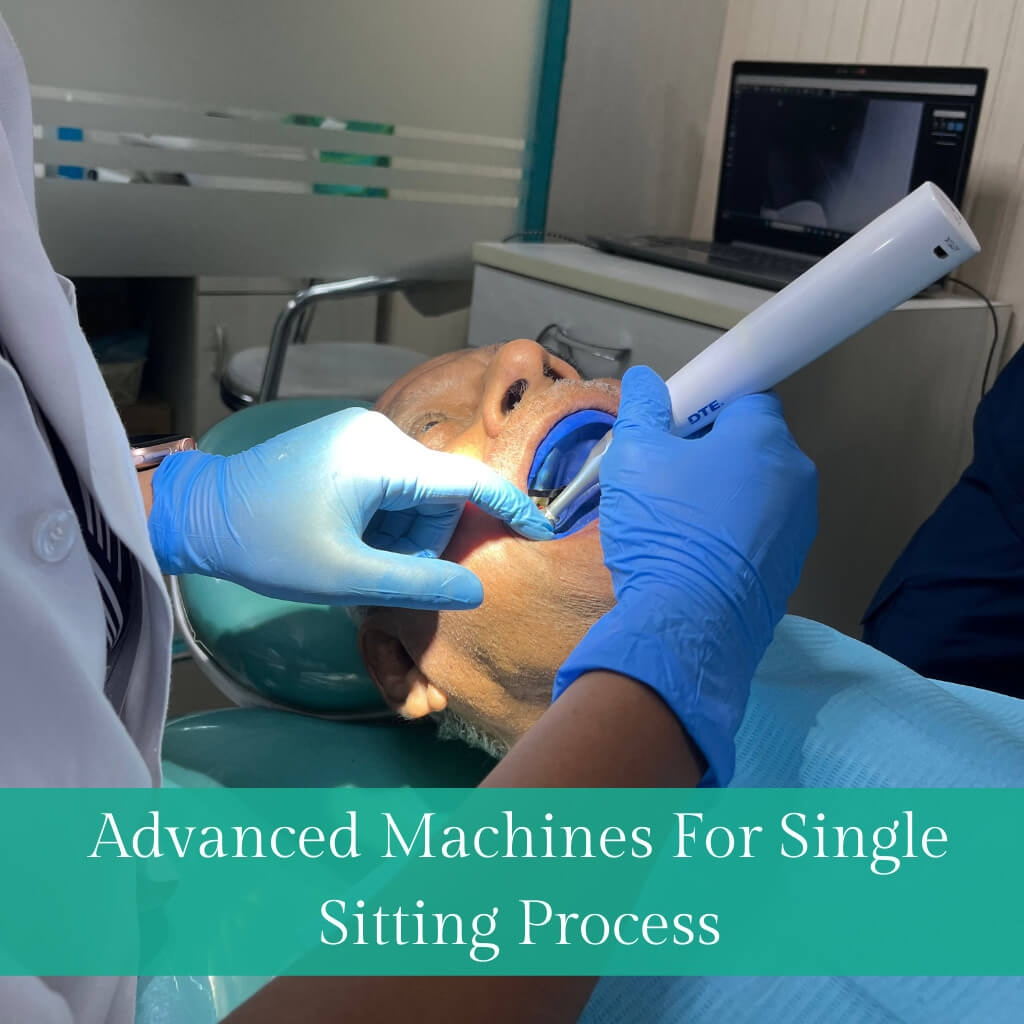Can LASERS Make RCT More Effective and Painless?
Do you recoil in fear at the thought of root canal therapy? You're not alone.
But what if you could experience RCT without the fear and pain? With laser-assisted root canal therapy, you can.
Discover how lasers are revolutionising the way root canals are performed and how you can benefit from this innovation.
Key Takeaways
- Laser-assisted Root Canal Therapy (LARCT) is a minimally invasive procedure that employs laser technology to provide superior canal disinfection and create a bacteria, virus and spore-free environment.
- Laser Dentistry enhances the efficacy and comfort of dental treatments by means of superior disinfection, reduces bacteria in the mouth, reduces post-operative discomfort and improves the longevity of the RCT.
- Laser-assisted RCT is a less invasive alternative to traditional RCT, resulting in reduced pain and discomfort, preservation of healthy tooth structure, improved outcomes and faster healing times.
What Is Laser-Assisted Root Canal Therapy?
Laser-assisted root Canal Therapy (LARCT) is a minimally invasive procedure that utilises laser technology to improve the effectiveness and comfort of root canals.
By using a laser, dentists can efficiently clean the damaged pulp from the root canals, ensuring a clean and bacteria-free environment. Moreover, the laser aids in complete disinfection of the root canal to prevent re-infection.
LARCT is known for its precision and minimal discomfort, often resulting in a painless patient experience. Additionally, laser technology enables faster and more accurate root canal treatments, reducing the time spent at the dentist's office.
Furthermore, LARCT tends to be a cost-effective alternative to traditional root canals.
Advantages of Laser-Assisted RCT
Laser-assisted Root Canal Therapy offers numerous advantages over traditional root canals.
- Zero Pain: Patients often experience less pain and discomfort during and after Laser assisted root canal compared to traditional methods, thanks to the minimally invasive nature of laser technology.
- Enhanced Precision: Lasers are highly precise, minimising damage to surrounding tissues and ensuring accurate removal of infection from the pulp chamber and root canals.
- Faster Healing: Laser assisted root canal can promote faster healing and reduce the risk of complications, as it encourages healthy tissue growth and reduces inflammation.
- Reduced Risk of Infection: The high-intensity laser energy can disinfect and sterilise the root canal space more effectively by even eliminating spores, thereby reducing the risk of post-treatment re-infections.
- Minimised Bleeding: Laser technology can seal blood vessels during the procedure, minimising bleeding.
- Preservation of Tooth Structure: Laser assisted RCT allows for better preservation of the tooth's natural structure, potentially reducing the occurrence of tooth fractures in long-term follow-ups.
- Reduced Post-Treatment Discomfort: Laser assisted RCT may result in less post-treatment discomfort, making it a preferable option for many patients.
- Less Anesthesia Required: Patients may require less local anaesthesia, reducing potential side effects due to the reduced discomfort associated with Laser assisted RCT
The Science Behind Laser Dentistry
Laser Dentistry harnesses cutting-edge laser technology to significantly enhance the efficacy and patient comfort in root canal therapy.These dental lasers emit a concentrated beam of light energy, offering a remarkable improvement over traditional methods. This precise laser energy gently disinfects the concerned area, simplifying the process of cleaning and disinfecting the root canal thoroughly.
Moreover, it plays a crucial role in eliminating the spores and sealing the treated area, effectively reducing the risk of post-treatment infections. Thus, laser promotes a sterile environment and contributes to decreased inflammation and patient discomfort. In essence, laser dentistry is revolutionising root canal therapy by offering a more precise, less painful, and minimally invasive alternative to conventional procedures.
Comparing Laser-Assisted RCT to Traditional RCT
Laser-Assisted RCT: A Modern Approach
Laser-assisted Root Canal Therapy (RCT) represents a modern and innovative approach to addressing dental issues. This method utilises a focused laser beam to target and remove infection in the pulp tissue within the tooth. This procedure offers several advantages, including enhanced precision, reduced patient discomfort, and faster healing times.
Laser technology minimises the need for traditional dental instruments like drills and files, which can be noisy and produce vibrations that some patients find uncomfortable. Moreover, the laser's ability to effectively disinfect the root canal can reduce the risk of post-treatment infections, making it an appealing option for those seeking a less invasive and more efficient RCT experience.
Traditional RCT: The Conventional Method
Traditional Root Canal Therapy, on the other hand, represents the long-established and widely practised method for treating infected dental pulp. This approach involves the use of manual instruments like drills and files to access and remove the damaged tissue from the root canal.
While it has been proven effective over the years, traditional RCT may be associated with more discomfort and a longer recovery period due to its invasive nature. Patients might experience more noise and vibration and a greater need for local anaesthesia during the procedure. However, it remains a viable option in many cases and is a well-understood and reliable method for addressing dental infections.
Is Laser-Assisted RCT Right for You?
Determining whether laser-assisted RCT is the right choice depends on several factors, including your dental needs and preferences. Here are some considerations to help you decide:
- Treatment Goals: If your primary goal is to minimise pain, discomfort, and the recovery period associated with root canal therapy, laser-assisted RCT may be a suitable option.
- Dental Anxiety: If you experience dental anxiety and prefer a quieter, less invasive, and potentially less painful procedure, lasers may offer a more comfortable experience.
- Complex Dental Conditions: If you have complex dental issues, such as difficult-to-access or curved canals, laser technology' precision can enhance the success rate of your treatment.
- Sensitivity Concerns: If you're concerned about post-treatment sensitivity, lasers often result in less sensitivity compared to traditional methods, making them an attractive choice.
- Healing Time: If you want to speed up your recovery and return to regular activities sooner, laser assisted RCTmay promote faster healing due to reduced inflammation and tissue regeneration.
It's essential to thoroughly discuss with your dental professional whether laser-assisted RCT aligns with your circumstances and treatment goals.
FAQ’s
Conclusion
At Hope Dental & Esthetic Clinic, Noida, we offer laser-assisted root canal therapy as a painless, efficient and effective procedure.
Laser-assisted RCT can be a lifesaver for those who experience anxiety when it comes to the dentist's chair. Book your appointment at Hope Dental & Esthetic Clinic, Noida, today!




